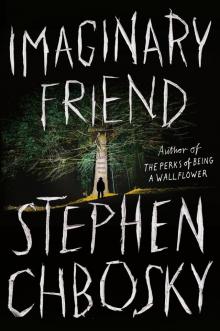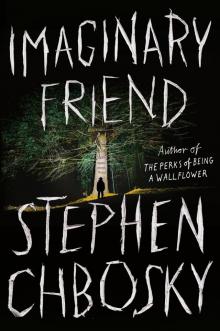- Home
- Stephen Chbosky
Imaginary Friend (ARC) Page 17
Imaginary Friend (ARC) Read online
Page 17
The kids were outside with their sleds and their snowmen. The sheriff would have much rather been a kid running around with a sled than a grown-up trying to figure out if the town would have enough money in the budget for additional road salt. When he was a kid, he hated the salt that took away the snow. Now he hated the salt even more.
Because it took him away from the case.
Maybe it was the fact that it involved Kate Reese’s kid. Maybe it was the fact that the sheriff was used to a city pace, and as much as he initially wanted the quiet life of a small town, he wanted to do real police work again.
Whatever it was, it seemed like the more time he spent in those woods, working the crime scene and looking for clues, the more engaged, focused, and passionate he felt. If he didn’t know any better, he would say that he was almost becoming smarter. Because even with all the distractions, he was able to turn four basic pieces of information…
A boy.
Eight years old.
Fifty years ago.
Buried alive.
…into a near-positive ID of the child. He would need a DNA test to confirm it. But he was almost sure of the victim’s name.
David Olson
The sheriff sat at his desk. He opened the cold-case file and unfolded the brown faded missing poster. David Olson was such a cute little boy. Big cheeks. Big smile. Even with the missing front teeth.
The same missing teeth they found on the skeleton.
The sheriff moved the poster aside and looked at copies of all the newspaper clippings from the Pittsburgh Post-Gazette and the old Pittsburgh Press before it shut down. There was even a mention of it in the local Pennysaver.
According to the papers, David Olson was at home with his older brother and the brother’s girlfriend. His parents were downtown, enjoying a show at Heinz Hall after a dinner at the Duquesne Club. According to the initial police report, the older brother said that someone had placed a baby carriage on their porch with a tape recorder playing a baby’s cries. The perp (or perps) must have used this diversion to take David Olson from his bedroom.
The police pulled out all the stops (and spent most of the town’s budget, the sheriff knew) to close down roads and highways. Deputies and volunteers walked through the entire town including the Mission Street Woods. But in the end, they couldn’t find so much as a footprint.
It was as if David had been taken by a ghost.
When they were unable to find a suspect, the suspicion turned to the family. To sell a few papers, some muckraking reporters accused David Olson’s father of killing his own son. The “Mad Dad” story stuck for a little while, especially when it was discovered that the family had taken out a whole life policy on David. But without any proof, the story quickly died (along with the newspaper sales), and the reporters focused on the older brother.
The worst of them accused the older brother of murder. The best of them simply asked the question, “How does it feel to know you were there when David was taken?” The older brother, to his credit or detriment, was very open with the reporters to keep the story alive. But eventually, other news became more interesting, and the family was left with the burden of being the only people who knew how the story ended. How the crime was never solved. How the perp (or perps) were never caught. How the family was left to find meaning in the place of answers. How the town stopped looking because they were out of leads and needed the money for road salt to keep the rest of their population safe.
The sheriff put the case file away with the missing poster on top. Then, he looked up at all the current missing posters on his bulletin board. Faces of men, women, and children. Sheriff’s departments would send these pictures to one another like boys trading baseball cards. All in the hope (vain or real) that by some miracle, a child taken in Hershey would wind up in Philadelphia. Or the old man with dementia who wandered off in Harrisburg would somehow find his way to Pittsburgh. Sometimes, the faces changed when a child was rescued, Grandpa was found, or a teenage runaway decided that the hell at home was nothing compared with the hell on the street. But as much as the faces changed, the bulletin board never did. It was always full like the opening of The Brady Bunch.
The board was such a constant that the sheriff rarely noticed a particular face above the others. But there was one missing poster that stood out to him now. Maybe it was her age. Or her blond hair. Or the fact that she looked a little like the girl with the painted nails. Whatever it was, the sheriff was always aware of one missing girl.
Emily Bertovich.
She had gone missing four months ago, but her parents must have had some pull in their hometown of Erie, Pennsylvania (or a whole lot of money). Because her case was still treated like it was twenty-four hours fresh. New pictures. New posters. Even the old milk carton campaign came back for this girl. Her poster looked as new and freshly printed as David Olson’s was brittle and faded. Someday, Emily’s poster would be old, too. And hopefully, she would be safe in her mother’s arms. The sheriff could feel his mind wandering again from Emily Bertovich back to the girl with the painted nails, but he quickly stopped himself.
He had work to do.
The sheriff went outside to dig his car out of the snow. Then, he drove his cruiser over the salted roads, looking at the children playing on the 3 Hole Golf course with that amazing sledding hill. He saw the little kids in their colorful jackets running up the white snowy ridge.
Just like balloons in the sky.
He cracked the window a little to take the fog off his windshield. Fresh, cold air filled the car. He heard the children and their screams of delight as they raced down the hill and ran back up only to race down it again. The sound made him smile. A bright moment in a grey day.
The sheriff finally arrived at the old folks home. Mrs. Collins was on the porch, standing next to her mother in the wheelchair. Her mother was saying something nonsensical about the end of the world as Mrs. Collins berated three teenage volunteers to “put their backs into it” and shovel all the snow from the front porch. The sheriff felt especially bad for one of them.
“We don’t want my mother falling and breaking her hip, do we, Mary Katherine?”
“No, ma’am,” Mary Katherine said, her face red and snotty from the cold.
The sheriff was not looking forward to this little chat with Mrs. Collins. He remembered when he first took the job, the Collins family invited him over for dinner in their ten-thousand-square-foot McMansion with the long driveway and swimming pool and tennis court and wine cellar that was slightly bigger than his apartment. Just a nice, cozy dinner to politely remind him that the second word of “civil servant” was “servant.” And if he was the town’s servant, then they were the masters. Nothing was ever said. But it was understood. The sheriff endured their tense “We are normal. We are fine” display. Especially when Brady spilled his soup on the fine linen and tensed up like a guy caught skimming from his drug-dealing boss. The sheriff knew the minute the door closed, Brady was going to catch hell. But at least he had a ten-thousand-square-foot-mansion to be miserable in. The girl with the painted nails didn’t get a hundred.
And Brady’s mom could cook. He had to give her that.
Everything had been just fine between master and servant until a skeleton was found, and the sheriff ordered the woods shut down pending a further investigation.
“Sheriff, I don’t have another week to lose,” Mr. Collins had told him. “But I do have a team of lawyers.”
“Great. Then, maybe you can get them out here to help us dig for more skeletons on your land. You’re building family-friendly suburbs. You don’t want those news vans to think you don’t care about a dead child, right?” the sheriff said.
It wasn’t exactly the shot heard ’round the world, but it was enough to prompt Mr. Collins to go “new sheriff shopping” the next election. But the sheriff didn’t care. As long as he solved the case, the community would stand by him, and he would keep his job. And if not, then not. He had seen worse things
than second place.
“Hello, Mrs. Collins. How is your husband?” the sheriff said politely.
“Wonderful. He’s so pleased that you’ve stopped his construction…for another week.”
“Just trying to keep the town safe, ma’am,” the sheriff said, tipping his cap with the tone of giving her the finger.
“Well, you’re doing a wonderful job,” she said with a smile.
When the sheriff entered the home, he saw Kate Reese at the end of the hallway. She was taking out the Christmas decorations from a box. And she looked just as beautiful as she did the night of their date that started at 6:00 p.m. and ended when Mr. Wong said in his broken English that “we close now.” The sheriff didn’t know how five hours had passed, but they had, and then it had been time to break open their fortunes.
“What does yours say?” he had asked.
“A Friend in Need Is a Friend Indeed. How about yours?”
“You Will Find Happiness with a New Love.”
Ten minutes later, they were making out in his car in the parking lot like sixteen-year-olds. They had only kissed, but that only made it better. He hadn’t had time to see her since.
“What are you doing out in this storm?” Kate Reese asked.
“I’m the sheriff. What are you doing?”
“I’ve got a mortgage. And Christopher is out with his friends, sledding.”
The sheriff could feel the shift in her. Once she learned that the skeleton had been in the ground for fifty years, she had relaxed with her son. A little.
“No more house arrest?” the sheriff asked.
“Parole,” she said. “If he goes in those woods again…solitary.”
The sheriff could feel eyes prying into their conversation from every corner of the place. From the old ladies playing cards through their arthritis to the staff sneaking cigarettes outside. So, he leaned over privately and whispered the reason he was here. She nodded and walked him down the hallway into one of the rooms. Then, she left him to his police business. The sheriff saw the old man sitting in his chair, bandages wrapped around his head from his exploratory eye surgery.
“Excuse me, sir? This is Sheriff Thompson,” he said.
“Well, hello, Sheriff. Nice to know you actually work since I voted for you,” Ambrose said. “How can I help you?”
The sheriff took his hat off out of respect even though the old man couldn’t see him do it. He took a seat across from him.
“Sir…my men combed the woods and found the body of a little boy.”
“Yes?”
“I believe it’s your little brother David.”
David Olson’s older brother, Ambrose, sat still as a statue. The sheriff couldn’t see his eyes. But slowly, he noticed that tears started running from the bottoms of his bandages.
Chapter 33
Christopher looked at the sky filled with clouds. He couldn’t remember ever seeing so many. Big beautiful clouds spilling snow on them like confetti at a parade.
His friends couldn’t believe their luck.
A snow day!
A big delicious snow day.
“Jeez, Chris. Maybe you really do control the weather,” Special Ed joked.
Christopher forced a smile. Of course, he knew the snow could have been a coincidence.
Or not.
His mother had dropped him off at the 3 Hole Golf course that morning to meet his friends for “sledding” with a hug, a kiss, and a stern reminder.
“No woods. I’m not playing around.”
“Thanks, Mom,” he said.
“There’s no thanks here. The only reason I am letting you do this at all is that half the town is on this hill. Do not leave this spot until I come back.”
“Yes, ma’am,” he said.
The mothers told their boys they would pick them up after work (or a day of beauty in the case of Special Ed’s mom). Either way, that gave them more than eight hours to get back to the tree house and finish.
This was their chance.
They waited for their mothers to drive away, then walked back through the parking lot with their red plastic sleds. They passed parents grumbling about longer commutes and road conditions while their children made plans with their friends to squeeze the most out of God’s unplanned vacation day.
Fueled by Special Ed’s thermos of hot chocolate and backpack of junk food, the boys trudged through the snow all the way back to the Mission Street Woods. They stopped just outside it. The trees were limp under the weight of the snow. Silent witnesses to history. Christopher thought these trees had been here for hundreds of years. Maybe thousands. These trees were older than their country. These trees would be here long after they were all dead.
Unless Mr. Collins got to them first.
Christopher led the boys to the spot where he hid all the windows. As they dug them out, the snow got caught on their wrists, giving their arms an ice cream headache. But Christopher felt nothing.
They reached the clearing within five minutes, dragging the windows behind them on their red plastic sleds. The boys fought their way through the snowdrifts. Cutting through the beautiful white powder that seemed to hide the clearing away from the world. Like a mountain before anyone ever thought to ski.
They reached the tree.
They did not speak. They just worked in silence, occasionally grunting a word to coordinate tying the rope off to hoist the windows up. Or get the right screwdriver. Or seal the windows with weather stripping.
Special Ed and Mike used their muscle to move the planks of the roof into place. Their hammers pushed the nails through the wood like a knife through warm butter. The wind whipped around, turning their cheeks red and wet with cold. They finished the roof within two hours while Matt and Christopher put black shutters on the windows. When the roof was laid down, all four boys climbed on top of the tree house and began nailing down the shingles. One by one. As fast as they could. Tap tap tap like four manual typewriters.
Until they were done.
When he reached the last shingle of the roof, Christopher stopped. There was one more nail to drive home. He asked the guys who would like to finish it.
“You do the honors,” Mike said.
“Chris! Chris! Chris!” his friends cheered.
Christopher grabbed the hammer and struck the last nail. They all carefully climbed down off the roof to the ground. The four boys stood, looking up at their creation with silent reverence. A perfect little tree house with shutters and windows and a real door with a lock. The floor with the secret door and a rope ladder for emergencies. It was beautiful. Exactly as Christopher pictured it in his mind. It was better than his graph paper drawings. Better than any house he ever planned except for the ones for his mom.
The tree house was done.
“Who wants to climb first?” Matt asked.
There was no debate.
Christopher climbed.
His friends followed.
The boys moved up the 2x4 stairs like baby teeth. They reached the little porch. Christopher opened the door like a doorman and let his friends walk in first. One by one. Special Ed, then Mike, then Matt. The three boys huddled in the tree house and started talking about how they were going to bring out furniture and iPads to watch movies. Maybe even a little propane stove to make Jiffy Pop.
As his friends made their excited plans, Christopher looked back at the clearing. He saw deer poking their heads through the bushes. Grazing on the last patches of green before the winter threatened to starve them. He listened. There was no sound. No wind. Just a steady pouring of snow from the clouds in the sky. Christopher saw that the cloud face was back. Smiling and drifting as it dropped snow on him like cotton candy. The snow was so thick, it covered all their footprints.
As if they were never there.
“Come on, Chris. Close the door. It’s freezing,” Special Ed said.
Christopher turned back to his friends. But not before staring at the white plastic bag, which had been silent all d
ay. He looked at it, hanging on the low branch. Waiting patiently. Then, he stepped his foot over the doorframe and entered the tree house. Christopher knew the minute he closed that door, he would have his proof. Either he was crazy, or there was something on the other side. Either there was no nice man, or he was about to meet him in person.
“But what does the tree house do?” he had asked the nice man once.
you’d never believe me. you’ll have to see it for yourself.
Christopher closed the door.
* * *
After a moment, a small bird landed on the doorknob. It looked around at the deer slowly crawling in a circle toward the tree house. Each step in unison. The bird did not like things it was not used to seeing, so it flew away. It flew up through the snowflakes and freezing air. It flew up past the tops of the trees and kept going higher and higher until it had reached the bottom of the clouds that looked like faces.
Then, it turned.
The bird looked back down at the earth. It saw the woods, the snowy white clearing with the deer, and the little tree with the tree house. And if it had words to describe what it saw, it would have sworn that it looked like a stark white iris with brown flecks and the black pupil of…
A giant eye.
Part IV
Seeing Is Believing
Chapter 34
hi. how are you? are you okay? don’t worry. just breathe. you’ll adjust. just remember a couple of things. are you listening? calm down. i know you can’t see. you’re not blind. you’re passing to the imaginary side.
your friends are not with you. they still think you’re with them on the real side. but you are not alone. i am waiting for you. i will never let you come in here alone. i am your friend forever.

 The Perks of Being a Wallflower
The Perks of Being a Wallflower Imaginary Friend (ARC)
Imaginary Friend (ARC) Imaginary Friend
Imaginary Friend Pieces
Pieces